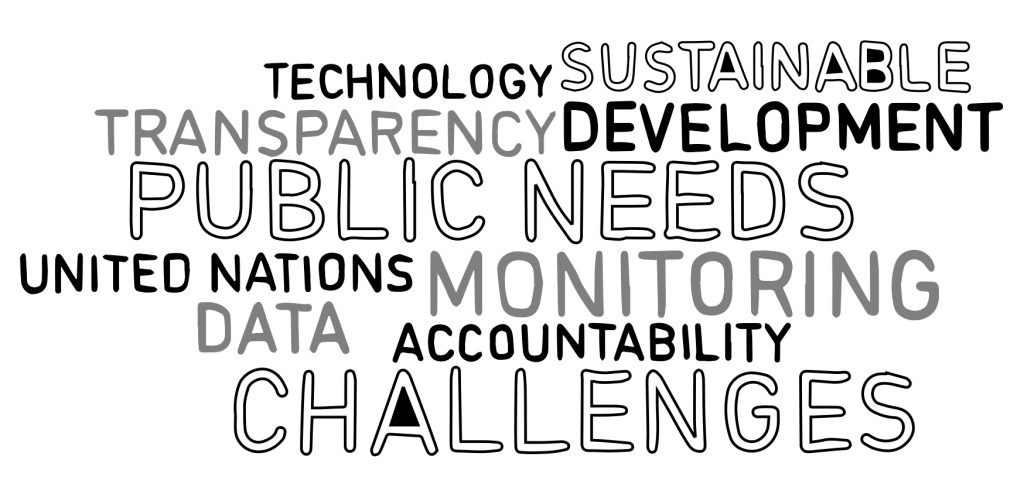Adopted on September 25th 2015, the 17 Sustainable Development Goals (SDGs) drive an ambitious post-2015 development agenda for the coming 15 years. Building on the 8 Millennium Development Goals (MDGs) of 2000, the SDGs go further in tackling major development challenges of our World. Ranging from eradicating poverty to promoting peaceful and inclusive societies, most of the SDG goals and targets could use open government data (OGD) to succeed. This article gives a brief overview of what open government data is and how it can help achieve the United Nations Sustainable Development Goals. Finally, the article touches upon the current challenges that prevent open government data to be used effectively in solving development issues.
Advocates and experts of OGD gathered in Sebastopol (United States) in 2007 to define open government data and its principles. The term open government data can be divided into two different, but complementary, words: government data and open data. Government data refer to ‘any data and information produced or commissioned by public bodies’. Open data ‘are data that can be freely used, reused and distributed by anyone’. Today, many governmental agencies produce and collect a wide range of data. Sharing these data on a public platform allows private businesses, academia, citizens, and civic organizations to get informed and reuse data for valuable and different purposes. Citizens are usually interested in secondary type products such as mobile apps or new services, while entrepreneurs look for raw data and activists demand access to internal government documents.
How can open data accelerate sustainable development?
Sustainable Development Goal 16 aims at building effective, accountable, and inclusive institutions at all levels. From a public sector point of view, opening up government data significantly increases transparency, strengthens trust in government, and helps improve essential public services. The right to access and freely reuse information holds the government directly accountable to its citizens and creates a basis for public participation and collaboration. Initiatives such as opensecrets.org in the United States or Kawalpemilu.org in Indonesia illustrate how open government data sustain good governance and thus help achieve Goal 16. The Open Secret initiative uses open government data to examine multiple aspects of money in politics. Their work includes analysing finances and budgets of interest groups as well as analysing federal lobbying of Congress members. In contrast, Kawakpemilu uses public data to help volunteers monitor polling stations to ensure elections are fair.
OGD can also help improve food security, healthcare, education, and other private sector services that are critical to development. For instance, Farmerline in Ghana sends farmers mobile voice and text messages with essential information on weather conditions and crop prices. The initiative operates with OGD and non-governmental data. In this case, farmers can anticipate and protect their production from weather disasters. In Mexico, the initiative Medii uses geospatial data and OGD on pharmacy locations and prices to help customers find the medicines they need at reasonable costs. Hence, opening up government data enables co-development and co-creation in designing responses to public needs.
There are numerous initiatives around the world using OGD as a mean to achieve the Sustainable Development Goals. Nevertheless, opening up government data is a challenge and comprises numerous barriers. Besides technical challenges in harmonizing data from every public agency, online government datasets also require constant monitoring. For instance, citizens using OGD for the development of mobile applications could see their initiative abandoned if OGD is not updated. Thus, data collection, data sharing, and data monitoring are important components for the effective use of OGD. Second, data itself lacks value. Governments need to develop capacities such as open data programs or policies with the appropriate budget, technologies and communication strategies to effectively exploit OGD. While capacity development is essential, public awareness is crucial too. When governments do not communicate the existence of OGD to the public in a meaningful way, the benefits of OGD are weakened. Consequently, without increasing public interest and preparedness, OGD lose their value creation feature.
Open government data have an enormous potential to facilitate the achievement of the new Sustainable Development Goals. Nevertheless, because of technical and organizational challenges, there is still much progress to be done before open government data are utilized fully.
 Léa Duplan is a current 2nd year MPP student at the Hertie School of Governance. Currently, she is on a leave of absence, doing an internship in the Economic and Social Affairs Department of the United Nations in New York. There she is closely working on the United Nations e-Government Survey 2016. Before she started the MPP program at the Hertie School or Governance, she did her Bachelor’s degree in European Studies at Maastricht University in the Netherlands. Her main domains of interests are: Good Governance, Sustainable Development and European Affairs.
Léa Duplan is a current 2nd year MPP student at the Hertie School of Governance. Currently, she is on a leave of absence, doing an internship in the Economic and Social Affairs Department of the United Nations in New York. There she is closely working on the United Nations e-Government Survey 2016. Before she started the MPP program at the Hertie School or Governance, she did her Bachelor’s degree in European Studies at Maastricht University in the Netherlands. Her main domains of interests are: Good Governance, Sustainable Development and European Affairs.
References upon request.
